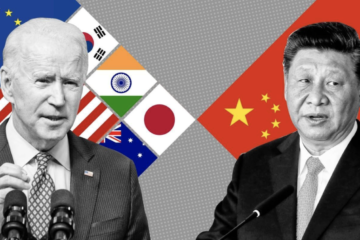Last week witnessed the 19th National Congress of the Communist Party of China (NCCPC), during which President Xi Jinping further cemented his leadership position and unveiled a vision for a new, more active Chinese foreign policy. Party congresses take place every five years in China, and in the past have focused on determining the party’s new leadership and articulating general policy objectives for the next half-decade. Usually the focus of these events is situated firmly on domestic issues within China, as opposed to foreign policy, with economic growth targets traditionally occupying a central position within the week-long talks. Surprisingly, GDP growth targets for the next five years, a centrepiece of former President Hu Jintao’s legacy, were omitted this year in favour of more internationalist rhetoric.
Even more surprising was the CCP’s top leadership moving forward, which was revealed at the 19th Central Committee’s first plenum. The new Politburo Standing Committee – the top leadership organisation in China’s government bureaucracy – includes Xi Jinping (General Secretary), Li Keqiang, Li Zhanshu, Wang Yang, Wang Huning (First Secretary of the Central Secretariat), Zhao Leji (Secretary of the Central Commission for Discipline Inspection), and Han Zheng. What is most surprising about this grouping is that, against precedent, there is not an obvious successor to Xi Jinping according to age and retirement norms. This, in addition to his enshrinement in the CCP Constitution, provides President Xi with unmatched authority – he will be China’s central political actor as long as he is alive. While much of the Western world faces a crisis of legitimate leadership, this is a remarkable trend indeed.

The 2017 NCCPC marked a definite caesura from previous, inward-looking conferences due to its promulgation of a more self-confident Chinese engagement with the West. This ‘New Era’ in Chinese geopolitics took two principal forms: on the one hand, the 19th Congress unanimously voted for amendments to the Communist Party Constitution to include ‘Xi Jinping Thought on Socialism with Chinese Characteristics for a New Era,’ alongside Marxism-Leninism, Mao Zedong Thought, Deng Xiaoping Theory, the ‘Three Represents’ and the Scientific Development Concept. In an international context, the addition of the ‘Community of Common Destiny’ in this is especially notable.
A practical example of the Xi administration’s new identity on the global stage is provided by the second major international theme of the 19th Congress, namely the promotion of the One Belt One Road Initiative, sometimes referred to as the Belt and Road Initiative (BRI). The BRI is the flagship project of the current Xi administration as reflected in the large-scale publicity it receives both in political speeches and in the state-run media. The gigantic aim of building a modern, direct trade route from the Chinese coast to Western Europe has led Beijing to stress the need for Chinese (and foreign) companies to invest in the web of construction projects this entails. A corresponding governmental focus on the destination of Chinese capital flows is consequently unsurprising. These developments should be seen in combination with new, seemingly restrictive, regulations on outbound investment published by Beijing last August. The official opening of China towards international cooperation as envisaged in ‘Community of Common Destiny’ rhetoric suggests that the new regulations are not intended to generally decrease current levels of investment outside of China. Rather, last week’s NCCPC suggests that recent guidelines on Chinese investment are actually an attempt to promote capital flows to projects that fall under the BRI. This politicisation of economic issues is hardly surprising for analysts of China’s developmental model. However the new scale of Beijing’s ambition, with an overt emphasis on determining the political and economic paradigms at the heart of international trade, underline a definite shift in Chinese grand strategy. Under Hu Jintao the semi-official guideline of Chinese diplomacy was encapsulated in the phrase “bide your time and hide your capabilities”. With Xi Jinping’s ideological cementation in the CPC Charter, a new era for China on the world stage seems to be dawning.


